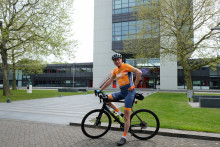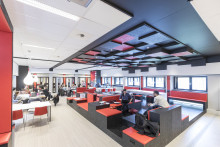The Ventoux, nicknamed the ‘bald mountain’ and the ‘Giant of the Provence’, is a mountain that is on the bucket list of many amateur cyclists. Somewhere between fear and ambition, they hope one day to hoist themselves up through the almost surreal lunar landscape. Jan Willem Polderman (66) is already familiar with the experience – three times in fact. ‘But never have I climbed the mountain three times in a single day. I’ve never even cycled so many elevation metres in one day. Yes, it will definitely be a heavy challenge.’
On 9 June, Polderman will participate in the Tour du ALS. He will participate in the ‘Malloot´ (Lunatic) category, which is the toughest category offered by Tour du ALS. Polderman will attempt to climb – and descend – the Ventoux from three different sides: Bedoin, Malausce and Sault. A distance of 150 kilometres, with about 4600 meters of elevation. ‘What makes the climb so tough is mainly its length: 21 kilometres each with long stretches of a 10 percent gradient average.’
Tom Mulder
Polderman has a special motive for conquering the bald mountain for charity. Former UT colleague Tom Mulder passed away late 2020 as a result of ALS, also known as motor neurone disease. ‘Tom’s passing is certainly a trigger for my participation. I was working with Tom a lot when the Twente Education Model was being introduced, at the time I was programme director of Applied Mathematics. The great thing about Tom was his ability to put himself in someone else’s shoes. While we, as a study programme, were looking for a way to apply this new educational model, we had many discussions with him. He was never dogmatic.’
'The cruel thing about ALS is that someone remains mentally very well, but in the meantime is completely deteriorated physically'
From his many interactions with Mulder, a friendship grew as well, says Polderman. ‘I visited him a number of times in Zwolle together with my colleagues Heleen Miedema, Irene Visscher-Voerman and Marjolein Dohmen-Janssen. Even when he could only communicate via an iPad, he was still just as eloquent, humorous and sociable. And above all extremely sharp; you could ask him substantive questions about, for example, exam committees, and he would later come up with a well thought-out answer. The cruel thing about ALS is that someone remains mentally very well, but in the meantime is completely deteriorated physically.’
Research and money needed
Polderman also saw this last week, at the kick off meeting of Tour du ALS in Ede. ‘There were patients with various stages of the disease present. In the Netherlands, 1500 people are living with ALS. Every year, about five hundred ALS patients pass away. Many people are therefore affected in their immediate environment. At the meeting, I happened to meet a colleague from the Applied Mathematics Department, Ruben Hoeksma, a lecturer in mathematics. He is going to cycle the Tour du ALS, also as a `Malloot’ for his father.’
The fight against this nerve and muscle disease requires a great deal of research and money, Polderman states. ‘The mechanism that causes the disease is extremely complex and largely not understood. There is some hope in the development of medication, but this is still in the earliest stages. I would like to raise money through the Tour du ALS – and fortunately Marjolein, Irene and Heleen are helping me with the fundraising.’
Love-hate relationship
Polderman is now fully preparing for his triple climb up Mont Ventoux. ‘Although I have a slight training backlog, since I had Covid just before Easter. The difficulty lies not so much the number of kilometres, but getting through all those elevation metres. Now, in addition to cycling in the Limburg hills, I train at home on the Tacx (an indoor cycling trainer, ed.). That is a bore, but the only way to somewhat simulate the altitude meters, with the Netherlands being quite flat.’
He is confident that he will make at least two of the three climbs. Whether a third climb will work out, Polderman will have to see during that day. ‘I have a love-hate relationship with cycling in the mountains. On the one hand it’s hard work, but on the other hand it’s fun, especially in interesting landscapes. I’m not particularly good at climbing, I have to find my own – moderate – pace and keep it, in my own gear - 34x34 for the experts. I am better at descending and see the descents as a reward for the effort put in.’






